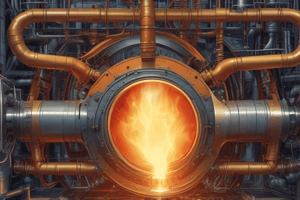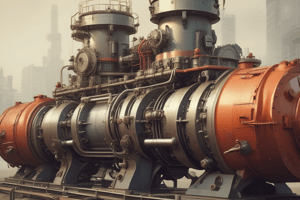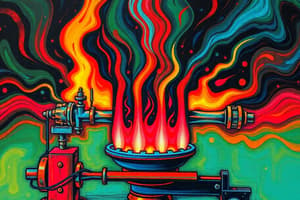Podcast
Questions and Answers
What happens to the impure part of the fluids received by the bladder?
What happens to the impure part of the fluids received by the bladder?
- It is absorbed by the large intestine.
- It flows downwards and is transformed into urine. (correct)
- It is immediately sent to the lungs.
- It is transformed into sweat.
Which organ is primarily responsible for the transportation and transformation of body fluids?
Which organ is primarily responsible for the transportation and transformation of body fluids?
- Lungs
- Spleen (correct)
- Bladder
- Kidneys
How do the kidneys contribute to maintaining moisture in the lungs?
How do the kidneys contribute to maintaining moisture in the lungs?
- By moistening the bladder.
- By regulating sweat production.
- By sending fluids to the large intestine.
- By sending fluids up to the lungs. (correct)
What effect does the loss of body fluids have on Qi?
What effect does the loss of body fluids have on Qi?
What can be a consequence of deficiency in body fluids?
What can be a consequence of deficiency in body fluids?
What is the primary role of Qi in the human body?
What is the primary role of Qi in the human body?
Which organ is primarily responsible for the production of Food-Qi?
Which organ is primarily responsible for the production of Food-Qi?
How does Qi influence blood dynamics in the body?
How does Qi influence blood dynamics in the body?
What function does Qi perform in relation to pathogens?
What function does Qi perform in relation to pathogens?
Which condition is associated with a deficiency in Qi?
Which condition is associated with a deficiency in Qi?
What is the role of the lungs in relation to Qi and blood?
What is the role of the lungs in relation to Qi and blood?
What is a consequence of blood deficiency in TCM?
What is a consequence of blood deficiency in TCM?
Which statement accurately describes the origin of body fluids in TCM?
Which statement accurately describes the origin of body fluids in TCM?
Which of the following best describes the function of Yuan Qi?
Which of the following best describes the function of Yuan Qi?
Where is Zong Qi primarily stored in the body?
Where is Zong Qi primarily stored in the body?
What distinguishes Wei Qi from Ying Qi?
What distinguishes Wei Qi from Ying Qi?
The normal vital activities of the human body depend primarily on which substances?
The normal vital activities of the human body depend primarily on which substances?
What is the primary role of Ying Qi in the body?
What is the primary role of Ying Qi in the body?
Which organ is primarily involved in the formation of Zong Qi?
Which organ is primarily involved in the formation of Zong Qi?
Which term refers to the combination of different forms of Qi in the meridians?
Which term refers to the combination of different forms of Qi in the meridians?
The main functions of Wei Qi include all of the following except:
The main functions of Wei Qi include all of the following except:
Flashcards are hidden until you start studying
Study Notes
Three Burners
- The upper burner is above the diaphragm and contains the heart, lungs, pericardium, throat and head.
- The middle burner is between the diaphragm and the umbilicus and contains the spleen, stomach and liver.
- The lower burner is below the umbilicus in the lower abdominal area.
Qi
- Qi is the vital energy that flows through the body.
- There are different types of Qi, each with its own function and source.
- Yuan Qi is the primary Qi, is present at birth and is nourished by food.
- Zong Qi is pectoral Qi, is a combination of clean air inhaled by the lungs and Gu Qi, essence from food and water.
- Ying Qi is nutrient Qi that circulates in the vessels.
- Wei Qi is defensive Qi, circulates outside the vessels and protects the body from pathogens.
- Zhen Qi is vital Qi that is the Qi of the meridians.
Functions of Qi
- Qi permeates all body parts and promotes growth and development.
- Qi helps the Zang-fu organs and meridians function properly.
- Qi promotes the circulation of blood and the distribution of body fluids.
- Qi warms the body and helps to maintain a stable temperature.
- Qi defends the body from external pathogens.
- Qi nourishes the body via nutrient Qi that circulates through the blood vessels.
- Qi aids in the transformation, transportation, holding, raising, protecting and warming functions of the body.
Pathology of Qi
- Deficient Qi can lead to weakness.
- Sinking Qi can be caused by Spleen deficiency.
- Stagnant Qi can be caused by Liver issues.
- Rebellious Qi is a form of Qi that is not flowing properly.
Blood
- Blood is a form of Qi.
- Blood is generated from food and drink.
- The heart governs blood and blood vessels.
- The spleen produces food-Qi which is essential for producing blood.
- The liver stores blood and regulates blood volume.
- The lungs help the spleen send food-Qi to the heart and infuse Qi into the blood vessels.
- The kidneys contribute to blood production.
Blood and Qi
- Qi generates blood.
- Qi moves blood.
- Qi holds blood.
- Blood nourishes Qi.
Blood Pathology
- Blood deficiency can result from Spleen Qi deficiency.
- Blood heat is caused by Liver heat.
Body Fluids
- Body fluids originate from food and drink and are transformed by the spleen.
- The lungs disperse pure fluids to the skin and send fluids to the kidneys and bladder.
- The kidneys send fluids to the lungs, provide heat for vital functions and transform fluids to create urine.
- The bladder transforms and separates fluids into pure fluids, which form sweat, and impure fluids, which are transformed into urine.
Qi and Body Fluids
- Qi transforms and transports body fluids.
- Qi holds body fluids.
- Loss of body fluids weakens Qi.
Blood and Body Fluids
- Blood and body fluids nourish each other and can be transformed into each other.
Pathology of Body Fluids
- Deficiency of body fluids can occur.
- Accumulation of body fluids can cause edema.
Studying That Suits You
Use AI to generate personalized quizzes and flashcards to suit your learning preferences.





